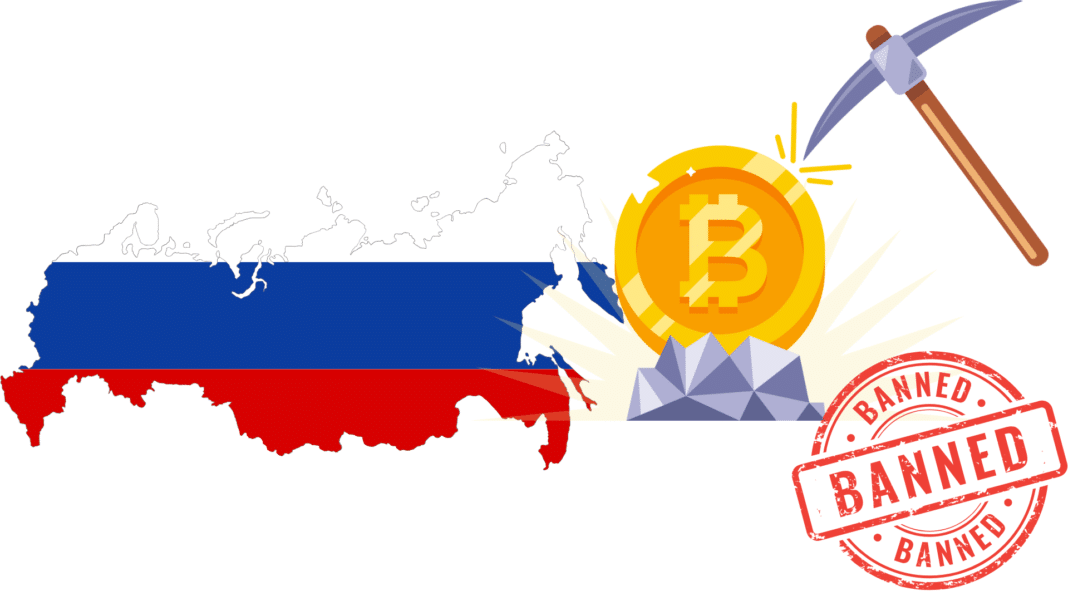As the war between Russia and Ukraine enters a new phase, Russian authorities on Tuesday, 19th November, launched a massive ban on crypto mining covering all occupied Ukrainian territories.
The announcement follows growing challenges in balancing electricity supplies during the energy-demanding autumn-winter period.
Russia Bans Crypto Mining In Occupied Ukraine
At a high-level meeting headed by Deputy Prime Minister Alexander Novak, top ministers discussed the nation’s and perhaps the world’s concerning energy situation, which is characterised as a “difficult regime balance.”
According to reports from both domestic and occupied regions, the government is focusing its efforts on energy conservation. The prohibition will apply to the areas of the Donetsk, Lugansk, Zaporizhia, and Kherson regions that Russia annexed as part of the war.
The prohibition is not limited to these regions. Six areas in Russia’s North Caucasus will face a complete crypto mining ban until 2031. Additionally, Siberian regions like Irkutsk, parts of Buryatia, and Zabaikalsky Krai will experience partial mining restrictions during peak energy-demand periods. Specifically, mining in Siberia will be banned from December 1 to March 15, 2025, with annual restrictions from November 15 to March 15 extending through 2031.
Russia on Cryptocurrencies
President Vladimir Putin had put a framework for regulating cryptocurrency mining and experimental infrastructure for cross-border payments into effect. That said, crypto transactions that happen domestically in Russian territory remain against an existing law.
Russia — the second-largest cryptocurrency mining hub after the United States — accounts for, as some reports mention, about 16 billion kilowatt-hours per year of its consumption related to these types of operations.
According to the Energy Ministry, this accounts for 1.5% of the electricity consumed nationwide. Authorities claim that curbing energy-intensive activities, including crypto mining, is necessary as the heating season is already putting strain on supplies.
According to the Moscow Times, the new measures are intended to help guarantee energy supplies for important services during winter. There will be no seasonal break for miners in the North Caucasus and occupied Ukrainian territories as they will be banned from December 2024 until March 2031. Regulations and taxation have become stricter.
Russia on Crypto Taxes
The action is part of more extensive efforts to rein in the fast-growing crypto industry. In parallel with the prohibition of mining, in Russia, a tax has been introduced on cryptocurrency mining and transactions at 15%. The draft tax first proposed by the Ministry of Finance is aimed at formalizing crypto-related economic activity and increasing state revenues.
These measures are presented as needed to stabilize the energy sector by lawmakers and regulators, but others see them serve a broader purpose in balancing domestic priorities with regional ambitions. The rules also highlight the Russian authorities’ ability to use cryptocurrency as a tool for avoiding international sanctions.
Observers point to the recent Russian-friendly position on crypto as mildly matching with the new prohibitions. November 1 marked the official legalization of crypto mining, which could be a decisive opening for the industry. However, 18 days later, the government reversed course and began implementing bans and limits that highlighted the need for energy saving versus economic expansion.
These steps are also a reminder of the many vulnerabilities Russia has, particularly as the war in Ukraine continues with no end on the horizon.
It will be a balancing act between energy demands, dealing with the pressure from its economic situation, and managing the international consequences of its responses in months to come.


